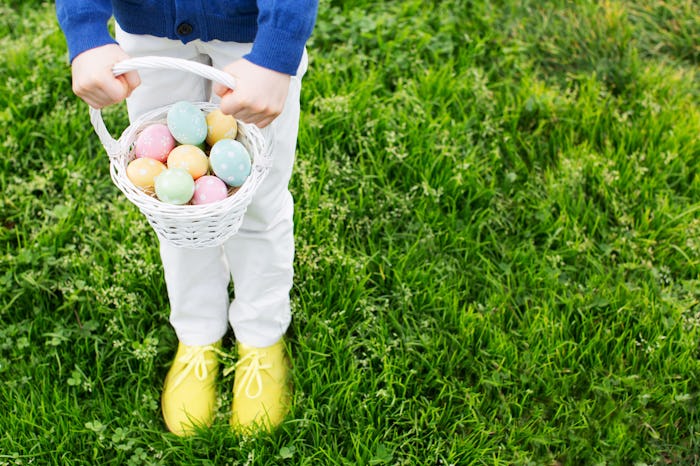Life
10 Genius Places To Hide Easter Eggs, To Keep The Kids Occupied For As Long As Possible
When kids are very young, hiding Easter eggs is easy: Behind a chair, under a bush — basically, wherever your tot will spot them without getting frustrated and having a major meltdown (little kids = little patience). For more experienced egg hunters, however, parents have to get a bit more creative when it comes to finding areas that aren't super obvious. So what are some genius places to hide Easter eggs?
Whether you're planning on holding your hunt indoors, outdoors, or a combination of both, there are plenty of nooks and crannies where your kids will never expect to find colored eggs. Don't limit yourself to areas of the house or yard that your kid is most familiar with (but at the same time, remember that sometimes the trickiest things to find are those that are more or less hiding in plain sight). In other words, try to think of all the places your kids are most likely to investigate, like the spaces between the couch cushions or the flower planter on the front porch, and then avoid those places like the plague. Remember, the Easter Bunny is a sneaky creature (not like Santa, who predictably leaves all his goodies behind in stockings and under the tree). If kids are going to fill their baskets, they've got to do a little detective work, but that's okay — all that searching will just make those jelly beans taste even sweeter.
Here are some sly ideas to get you started.
1A Carton Of Eggs
This one is so obvious it's not obvious at all: What kid would think to open the fridge and check the regular old egg carton for any colorful interlopers?
2The Laundry Hamper
If you find yourself constantly reminding your kids to pick up their dirty clothes off the floor and put them in a hamper, there's a sort of poetic justice to the idea of hiding an egg in something they'd never consider going near on an average day.
3The Dishwasher
Much like the laundry hamper idea, this is a particularly satisfying trick for any parent who literally cannot handle asking their kid to load the dishwasher one. More. Time!
4A Pair Of Shoes
There are actually a lot of different ways you can go with this: You can hide an egg in a pair of shoes your kid is planning to wear that day so he or she gets a big surprise before leaving the house, or you can make the search extra difficult by stuffing an egg in your own footwear (or even a pair of snow boots that's recently been relegated to the closet in the hopes that nor'easter season is finally over at last).
5The Mailbox
There's no mail delivery on Easter Sunday, but that doesn't mean your mailbox needs to be empty. It does, however, mean that your kids just might overlook this area on their hunt!
6In The Car Cupholder
This one is perfect for outdoor hunts, because even if your car is sitting right there in the driveway, your kids will probably be too busy looking in all the usual places (like the flower garden) to even consider your family vehicle.
7In The Piano
If you've got an upright piano in the house, hide an egg on the keyboard and close the cover (if you have a grand piano, there are even more available hiding spots!). This one doubles as a helpful reminder to practice, assuming your kids are taking lessons.
8A Sandbox
Whether you have a sandbox in the backyard or you're hosting a hunt at the local playground, burying a few eggs in the sand is bound to leave kids stumped for a little while (and keep them busy digging for an even longer while).
9A Box Of Cereal
Seems straightforward enough, but a box of cereal is likely one of the last places your kid is going to start rifling through. (If you want to be extra diabolical, open the cereal box super carefully and glue it back together so it looks brand new!)
10Your Kid's Pocket
Before you head outside for a hunt, your little one will likely need a light spring jacket, right? Imagine her shock when she realizes there was an egg in her pocket all along.
Check out Romper's new video series, Bearing The Motherload, where disagreeing parents from different sides of an issue sit down with a mediator and talk about how to support (and not judge) each other’s parenting perspectives. New episodes air Mondays on Facebook.
